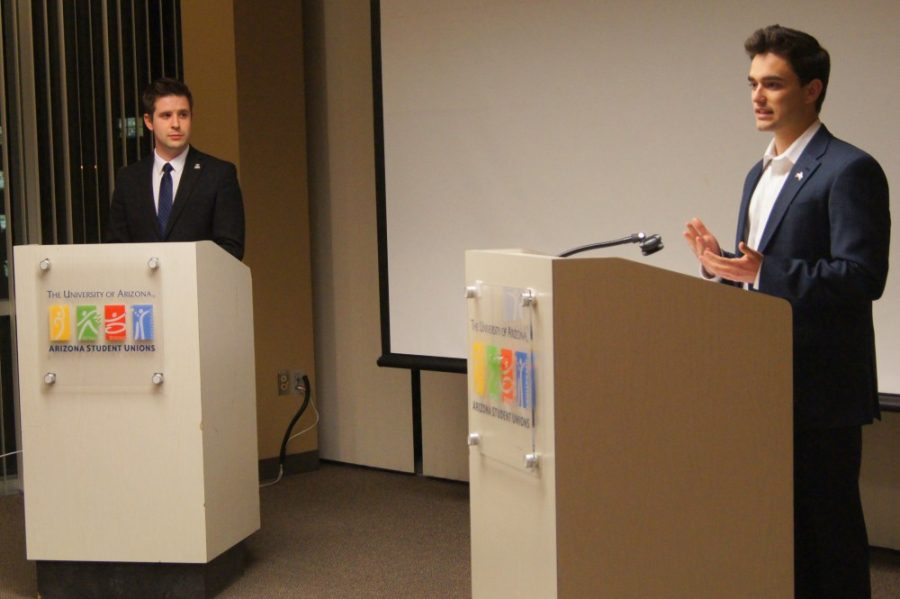Ahead of the ASUA general election, executive candidates debated student fees and the Arizona Board of Regents on Sunday. But one “incredibly controversial event” went unaddressed during the debate, according to one candidate.
After the debate, hosted by the Associated Students of the University of Arizona, presidential candidate Morgan Abraham, an engineering management junior, noted that none of the questions referred to a lawsuit filed against the regents last month by a student statewide lobbying group.
Candidates were also not asked to address the student government’s stance on the group, the Arizona Students’ Association, in general, though ASA has made headlines for its controversial use of student fee money to donate to a political campaign last fall.
“There were no issues. Let’s be real, that was about an hour of just fluff,” Abraham said. “No ASA questions, no questions like actually attacking each other of our platforms.”
Abraham, who said the “main point” he’s running on is outreach and that he has “around 20 platforms,” said he believes he can better ASUA with ideas such as a weekly YouTube video directed at students and a “We the people” tab on the ASUA website, allowing students to voice their problems and opinions.
In addition to critiquing the debate questions, Abraham also commented on his opponent’s performance.
“I mean, it would have been nice to have actually talked about the platforms that we’re running off of,” Abraham said. “I understand that my opponent isn’t running off of any real platforms or ideas but I would have liked the idea to have shared some of my ideas that I have and the reason that I’m running.”
Dylan Duniho, a creative writing junior, said he wouldn’t “grade himself” on his performance, but he did comment on his opponent.
“He kind of repeated his main concepts over and over, and they’re very ambiguous,” Duniho said. “I feel like I went into detail and specifics and he just kind of kept using the broad stroke terms for every question.”
Duniho, who is running on the slogan “Engage, innovate and advocate,” added that “ASUA does a lot of great things” but that he feels there is still room for improvement. He specifically referred the few amount of students who voted in the primary elections last week.
“We need to engage more students on this campus, if you saw the vote totals, close to 3,000 students voted,” Duniho said to the audience. “We have 40,000 students on this campus, you need a student body president who understands that the role of president is not a to-do list, that it’s a bigger concept of influence.”
Prior the debate, ASUA President Katy Murray, executive vice president Krystina Nguyen and administrative vice president Paige Sager led a senate question panel with the 12 senatorial candidates.
Topics included expanding diversity initiatives with the UA administration, clubs and organizations on campus, extending bursar’s system deadlines and the possibility of starting an on-campus, student-run nightclub. Current senate members attended the event, as well members of the Freshman Class Council.
Following the senate discussion, administrative and executive vice presidential candidates spoke at separate allotted times to present their platforms, answer panel questions, respond to audience questions and give closing remarks.
The lone administrative vice presidential candidate, Amanda Lester, a sophomore studying psychology and English, spoke before the four write-in executive vice presidential candidates addressed the crowd. The executive vice president position has no official name on the ballot.
“Being a write-in candidate I do face an uphill battle, but it is a challenge that I definitely embrace,” said Aaron Eirew, a political science junior, in his closing remarks.
Voting will be open from 8 a.m. Tuesday to 8 p.m. Wednesday, and can be done online at asua.arizona.edu. Results will be announced Thursday at 8 p.m. in the Ventana room in the Student Union Memorial Center.
Monica Contreras contributed to the reporting of this article.








